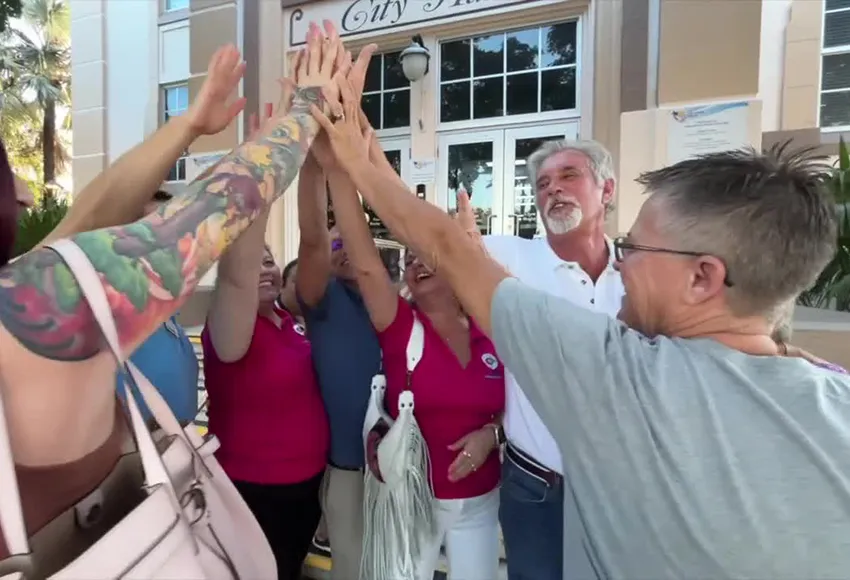
Florida city declares itself Queer sanctuary
In the light of aggressively anti-Queer legislation pushed by Florida Gov. Ron DeSantis and passed by the Republican-led legislature , the city of Lake Worth Beach has declared itself a sanctuary city for Queer people.
The City Commission unanimously adopted a resolution September 5, stating in part, "The City of Lake Worth Beach shall now and forever be considered a safe place, a sanctuary, a welcoming and supportive city for LGBTQIA+ individuals and their families to live in peace and comfort."
While about 40 cities, counties, and townships in Florida have Queer-inclusive nondiscrimination ordinances, Lake Worth Beach is the first to designate itself as a sanctuary city, according to numerous Florida media outlets, citing a press release from the Palm Beach County Human Rights Council.
"With so many LGBTQ+ people and allies fleeing Florida for less hostile states, we are thrilled Lake Worth Beach Mayor [Betty] Resch and the city commissioners continue to work to ensure the health, safety, and well-being of LGBTQ+ people and our families," said a statement from Rand Hoch, founder and president of the Human Rights Council.
Florida is one of the states in which an onslaught of legislation has curbed the rights of Queer people, forcing many to move to more affirming states and, according to a Human Rights Campaign report released in August, causing harm to the mental health of all types of Queer people, most especially Transgender people.
Tallahassee, the capital city, is considering a sanctuary designation, according to the Human Rights Commission. Several cities and states around the nation (including Washington state) have declared themselves sanctuaries to some degree, such as assuring that Trans people can access gender-affirming care in those locations.

Fertility clinic for Transgender people to open in Pittsburgh
Transgender residents in Pittsburgh will soon have a fertility clinic serving their needs.
Opening in the spring of 2024, the Allegheny Reproductive Health Center and Mate Fertility will partner to provide the area's Transgender residents sperm and egg donation, surrogacy, in vitro fertilization, hormone therapy, and some gender-affirming surgeries.
Dr. Sheila Ramgopal, an obstetrician and gynecologist at the Allegheny center, told the Philadelphia Gay News, "A lot of our clients [have] had massive difficulty [accessing] these services, both from an affordability perspective but also from a safety perspective, even the basics – going into a place where they feel safe and feel like they're in an inclusive community – because a lot of providers don't reflect those communities."
"A lot of the [fertility] services are actually very tailored for, let's say, affluent cis white women and heterosexual couples," Ramgopal added. "For the Nonbinary and Trans community, there's a massive gap in terms of all of us accessing care for fertility services."
The new clinic plans to offer these services at one-third to one-half of what other providers charge, Ramgopal said. "Our goal is to make this extremely accessible for people, no matter where you're coming from and what your financial picture is," the doctor explained.
The gaps in Transgender healthcare this clinic intends to address are substantial. The healthcare model offered in the upcoming clinic differs in some respects from others, especially in its emphasis on underserved Queer and BIPOC communities. The clinic also intends to address gaps in Transgender patients' access to information and care related to sexual health.
Importantly, it intends to cultivate a diverse staff reflective of its intended clientele. "We look at markets that are what we call fertility deserts or underserved markets," Mate Fertility CEO Traci Keen explained. "We try to find OB/GYNs, because there's this huge delta between the number of people in the United States who need access to care and the number of people who geographically have it or can afford that care, even if they do have some access in their market. The only way to start to bridge that gap is to bring OB/GYNs to the top of their license, which they can be doing."
Although the number of Queer-identified providers at the new fertility clinic is to be determined, Ramgopal has a diverse staff at ARHC, and Keen strives to ensure that there's "access, awareness, and intentionality" at Mate.

